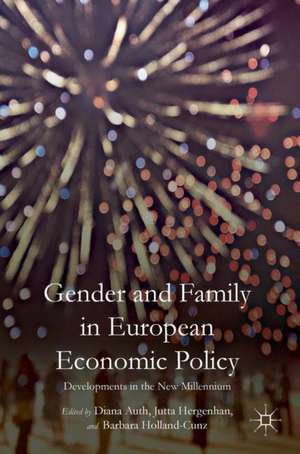Gender and Family in European Economic Policy: Developments in the New Millennium
Editat de Diana Auth, Jutta Hergenhan, Barbara Holland-Cunzen Limba Engleză Hardback – 23 dec 2016
| Toate formatele și edițiile | Preț | Express |
|---|---|---|
| Paperback (1) | 778.63 lei 6-8 săpt. | |
| Springer International Publishing – 22 iun 2018 | 778.63 lei 6-8 săpt. | |
| Hardback (1) | 783.20 lei 6-8 săpt. | |
| Springer International Publishing – 23 dec 2016 | 783.20 lei 6-8 săpt. |
Preț: 783.20 lei
Preț vechi: 955.11 lei
-18% Nou
Puncte Express: 1175
Preț estimativ în valută:
149.89€ • 155.90$ • 123.74£
149.89€ • 155.90$ • 123.74£
Carte tipărită la comandă
Livrare economică 14-28 aprilie
Preluare comenzi: 021 569.72.76
Specificații
ISBN-13: 9783319415123
ISBN-10: 3319415123
Pagini: 248
Ilustrații: XVI, 267 p.
Dimensiuni: 148 x 210 x 20 mm
Greutate: 0.48 kg
Ediția:1st ed. 2017
Editura: Springer International Publishing
Colecția Palgrave Macmillan
Locul publicării:Cham, Switzerland
ISBN-10: 3319415123
Pagini: 248
Ilustrații: XVI, 267 p.
Dimensiuni: 148 x 210 x 20 mm
Greutate: 0.48 kg
Ediția:1st ed. 2017
Editura: Springer International Publishing
Colecția Palgrave Macmillan
Locul publicării:Cham, Switzerland
Cuprins
1. Introduction: Re-Thinking Gender Equality since the Turn of the Millennium.- 2. Can We Call it a Revolution? Women, the Labor Market, and European Policy.- 3. Symbolic Policymaking for Gender Equality: Comparing the Use of Quotas for Civil Services and Corporate Boards in France and Germany.- 4. Overcoming the Gender Pay Gap: Equal Pay Policies Implementation in France and the United Kingdom.- 5. Equal Pay by Gender and by Nationality: A Comparative Analysis of Switzerland’s Unequal Equal Pay Policy Regimes across Time.- 6. Reconciliation of Employment and Childcare in Austria, Germany, and Iceland: Examples for Gender Equality in Family Life?.- 7. From Implicit to Explicit Familialism: Post-1989 Family Policy Reforms in Poland.- 8. Social Investment or Gender Equality? Aims, Instruments and Outcomes of Parental Leave Regulations in Germany and Sweden.-9. The French Parity Law: A Successful Gender Equality Measure or a “Conservative Revolution”?.- 10. Political Representation of Women in Europe: What Accounts for the Increase in the 2000s?.- 11. Successes and Failures of Electoral Gender Quotas in a Global Perspective.- 12. Targeted Measures versus Change of Political Culture: How can Gender Equality Best be Achieved?.
Recenzii
“This collection of essays offers a timely account of a range of gender- and family- related policies in a number of EU Member States. … Across the various chapters there is a great depth of information, and the book provides some very interesting insights into the case studies presented. One key theme that emerges across all chapters, is the role of culture in achieving or hampering the movement towards gender equality.” (Muireann O’Dwyer, Journal of Common Market Studies JCMS, Vol. 56 (2), March, 2018)
Notă biografică
Diana Auth is Assistant Professor at the Institute of Political Science at the Justus Liebig University Giessen, Germany. Her main research areas are comparative welfare state research, gender studies, elderly care research and social gerontology, and policy analysis.
Jutta Hergenhan is a Berlin-based political scientist. She is a researcher, lecturer, scientific translator, and editor. From 2012 to 2015, she was the executive director of the Research Group for Gender Studies at the Justus Liebig University Giessen, Germany. Her main research areas are gender and politics, language and gender, and transformation processes in the Mediterranean area.
Barbara Holland-Cunz is Professor of Political Sciences, with a primary focus on gender studies, and Head of the Research Group for Gender Studies at the Justus Liebig University Giessen, Germany. Her main research areas are political theory; women's movements, equality policy, and political participation; and the theory and sociology of science and nature.
Contributors
Catherine Achin, Paris Dauphine University, France
Francesca Bettio, University of Siena, Italy
Roland Erne, University College Dublin, Ireland
Gesine Fuchs, Independent Researcher, Switzerland
Cécile Guillaume, Queen Mary University of London, UK
Natalie Imboden, Unia, Switzerland
Sigrid Leitner, Cologne University of Applied Sciences, Germany
Hanne Martinek, Uppsala University, Sweden
Sophie Rouault, Bremen University of Applied Sciences, Germany
Christine Scheidegger, Independent Researcher, Switzerland
Dorota Szelewa, University of Warsaw, Poland
Textul de pe ultima copertă
This collection explores how pioneering gender equality policies have shaped women's economic presence in Europe since 2000. Equal pay policies, parental leave reforms, corporate quotas and electoral quotas have raised pressing questions about the effectiveness in promoting equal participation, as researchers quote both quantitative improvement in gender diversity and qualitative lag in cultural change. The chapters in this book present interlocking cross-national and cross-policy comparisons of the three most controversial reforms: equal pay, parental leave, and quotas for political representatives. The contributors address the cultural context in which reforms arose, internally contradictory policies, and the relative effectiveness of fast-track quotas and incentives compared to long-term efforts to change the overall culture of gender. This critical examination of the new millennium's groundbreaking gender policies will appeal to academics and practitioners interested in the progress of gender equality in the economic, political, and social welfare fields.
Caracteristici
Demonstrates the strength of combining policy, economics, and family studies Addresses both successes and shortfalls of innovative gender policies Investigates the relationship of fast-tracked solutions and long-term cultural change










